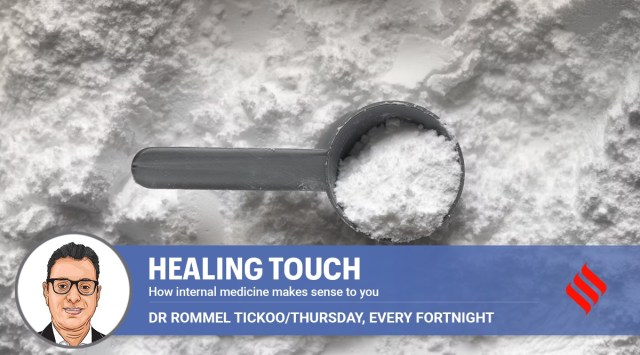- India
- International
Whey protein: Can it help you lose weight, reduce cholesterol and build muscle? How much should you have?
It is easily digested and absorbed by the human body, has antioxidant and anti-inflammatory properties and boosts body metabolism. But consult a doctor on whether you need it and whether it syncs with your prevailing health condition, says Dr Rommel Tickoo, Director, Internal Medicine, Max Super Speciality Hospital, Saket, Delhi
 There are many benefits associated with the consumption of whey protein because of its many therapeutic properties (Source: Unsplash)
There are many benefits associated with the consumption of whey protein because of its many therapeutic properties (Source: Unsplash) There is protein and there is good protein. Whey, which is the watery portion of the milk that separates from the curd when making cheese, has nine essential amino acids that makes it one of the best sources of protein around us. No plant protein can compare to its component of amino acids. It is easily digested and absorbed by the human body and this is the reason why athletes and body-builders use it a lot. And unfortunately, this is where much of the misunderstanding arises of it being just a gym supplement. It is not an anabolic steroid, period. It has anti-inflammatory and antioxidant properties, boosts body metabolism, promotes lean muscle mass and has a very high satiety value, which means you feel full for a longer time and can control your weight without overeating.
There are many benefits associated with the consumption of whey protein because of its many therapeutic properties. All your body needs is just 25 to 50 gms per day, which is about one to two spoonfuls. But it should only be given within prescribed limits to those who are grossly emaciated, the elderly, those suffering from inflammatory bowel diseases, those recovering from surgery or a serious illness and those who are not getting enough protein from normal sources. If you have a healthy intake of protein, you do not need to overload yourself with whey protein. Also, it should not be used by those who have liver and kidney diseases. Always consult a doctor on whether you need to use whey protein as a supplement and the quantity that suits you.
IT MAINTAINS BLOOD PRESSURE
Hypertension is one of the leading causes of heart disease. Whey protein contains lactokinins, which are angiotensin-converting-enzyme inhibitors (ACE-inhibitors) and are known to reduce systolic blood pressure. A study published in ‘The American Journal of Clinical Nutrition’ (2016) found how consuming 56 grams of whey protein per day led to almost a three-point drop in systolic blood pressure (the first number in a blood pressure reading) and a two-point drop in diastolic blood pressure (the second number) compared with the control group. Both whey protein and casein (also derived from milk) led to better blood vessel function as well as small improvements in blood cholesterol levels. Whey protein contains lactoferrin, which may block LDL (low density lipoprotein) or bad cholesterol from oxidising and hardening the arteries.
IT REDUCES INFLAMMATION
Inflammation is the body’s routine response to damage and is a signal that something is not right inside. Chronic inflammation may have negative effects on muscle growth and overall well-being. That’s when a whey protein supplement can dramatically reduce C-reactive protein (CRP), the most important marker of body inflammation.
BOOST TO ANTIOXIDANTS
Antioxidants, as their name suggests, minimize oxidative stress and reduce the risk of chronic diseases. And whey protein contains glutathione which increases our body’s defence systems.
CONTROLS HUNGER PANGS AND HELPS YOU LOSE WEIGHT

Once you start having whey protein, you can boost your energy expenditure by 80–100 calories per day. Yet it keeps you full enough to drop 440 fewer calories per day. In one study, it was found to cut cravings by 60 per cent and reduce the desire for late-time snacking by half.
Studies have shown that whey protein, combined with weight lifting, can cause weight loss of about 3.5 kg while increasing lean muscle mass. So, if you want to lose weight, a whey protein supplement can help you do so while holding on to your muscle. Whey protein is better as far as gaining muscle strength is concerned compared to casein and soybean.
WHY WHEY PROTEIN GETS DEMONISED LIKE OTHER PROTEIN POWDERS
Protein powders are derived from plant sources like soybeans and peas and animal sources like eggs or milk. These extracts are powdered and packaged for use. Those for muscle-building will have more protein than those intended for weight loss. In the absence of data on the side effects of high protein supplementation, manufacturers do not have a regulatory framework and tend to package what they feel is safe. Look for only-whey protein jars and read the label. Do not go for the combination powders as they contain added sugar, artificial flavouring, thickeners, calories, steroids and even heavy metals (lead, arsenic, cadmium or mercury). In the end, remember that whey protein is coming from cow milk, so it cannot be any worse.
Apr 27: Latest News
- 01
- 02
- 03
- 04
- 05








































